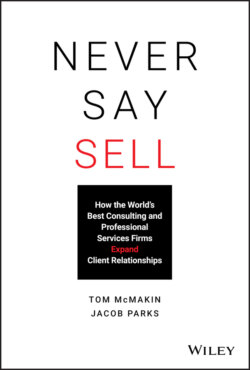Читать книгу Never Say Sell - Tom McMakin - Страница 53
Mutually Exclusive and Collectively Exhaustive
ОглавлениеIn 335 BC, Athens was conquered by the Macedonians. Aristotle, then a man of 50, returned to Athens after living overseas. There, he set up a school in the Lyceum outside the walls of the city. He'd lecture in the morning, with a particular emphasis on his great love – logic. The following classic example of a categorical syllogism demonstrates how he thought about logic:
All men are mortal.
Socrates is a man.
Therefore: Socrates is mortal.
Aristotle was particularly focused on what he called “categories” since he believed thinking clearly about how elements relate to each other was the ground from which deduction grew. “Men” is a category. It has a characteristic, called “mortality.” Socrates is a member of the “men” category; therefore, it follows that Socrates participates in that category's characteristic, “mortality.” In the Organon, Aristotle wrote that for categories to be useful, they must be distinct from each other: “Of things said without any combination, each signifies either substance or quantity …” Aristotle is saying that, assuming there is no overlap in categories (that's the “without combination” part), most categories relate to each other substantively or in number.
In 1963, a full 2,298 years later, McKinsey hired Barbara Minto. She was the first woman with an MBA brought on as a professional at McKinsey. Though she only worked for the firm for 10 years, her impact is still felt. Barbara argued, giving due credit to Aristotle, that when describing what has caused a problem, or how it should be fixed, the description of the parts should be “mutually exclusive and collectively exhaustive,” what she called MECE. Though this is most commonly pronounced “mee-cee,” Barbara said it should be pronounced “meece,” like “Greece.” As she put it, “I invented it, so I get to decide how it is pronounced.”
For example, if we are asked to list competitors to Ford Motor Company, we would want to include all other car companies (e.g., Chevy, Fiat, Porsche) and not leave any out for the list to be “collectively exhaustive.” At the same time, each of the companies on the list of competitors should be completely distinct from each other, or “mutually exclusive.” Porsche is owned by the Volkswagen Group and Fiat owns Chrysler, Dodge, and Alfa Romeo; so, for the list to be MECE, we'd want to specify whether it is a list of corporations or brands. Barbara argued that when comparing apples, we need to make sure not to add in any oranges or the result will be muddled thinking.
Barbara was our inspiration when asking the question: How do clients buy expert services? Each of the seven elements is logically distinct and together they represent an accurate picture of the whole. For example, a prospect needs to understand what we do in order to engage with us. Separately, they need to be able to buy from us or all the understanding in the world won't lead to them scoping a project with our firm. And the list goes on; in order to buy, all seven elements need to be present.
